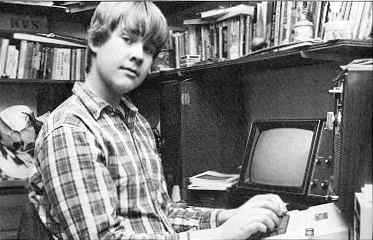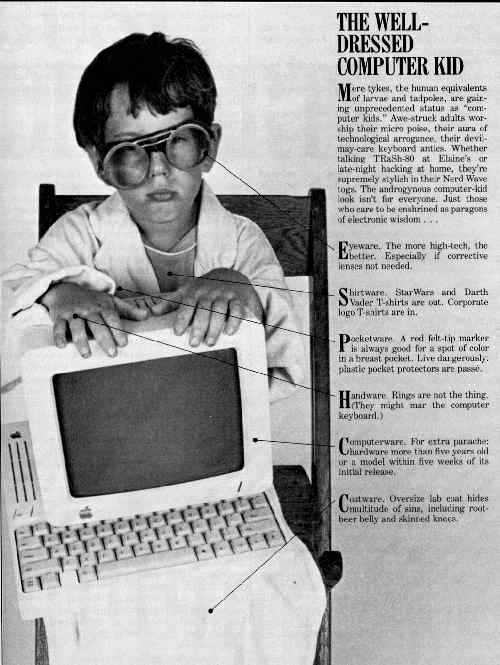ADULTS AND
COMPUTERS
by Luke Meade

Luke Meade is a student at Rippowam-Cisqua School as of this writing. He is fourteen years old.
Our family has a computer.
Actually, I should say I have a computer. My father obtained it, but I use it more than anyone else in the house. I have several computer-using friends, and it seems to be the case in most families that the children are more adept with the machine than their parents are.
In my view, adults relate strangely to computers. They'll approach the machine warily, and if you try to explain the basics of its operation they'll nod and smile in total confusion or ask at least one question for every sentence you utter. When my parents' party guests ask to see the computer, I comply by showing them the machine and running a program for them.
"Now," I'll say, " `run' tells the computer to execute a program. So when I type `run' followed by a program name, the computer enters the program into its memory and then executes it. See?"
"Um . . ." comes the reply.
"It's a very practical machine, the Apple II Plus. For instance, I can keep track of all my school grades in this Notebook program, which I also use as a limited word processor."
Usually when they hear the dread term "word processor," the guests stop trying to understand what I'm talking about. Sometimes they'll just say, "Oh?"
"Yes," I'll say, "and I can also keep track of my record, book and comics collections on the same disk. Then I can use the computer to check my algebra homework and keep tabs on my allowance."
"Really?" they'll say. "I had no idea computers were so useful."
Now I'm getting somewhere. "The uses of computers are virtually limitless. Then, of course, there are arcade games."
"My son"-or daughter, as the case may be-"loves those games. But we don't think it's worth all that money just to play games. Can you show us another program?"
"Right. Well, when I load this other program, Space Invaders will go out of the computer's memory and be replaced by Algebra Tutor or whatever. Got it?"
"Um ... "
"Now, memory is made up of kilobytes, referred to as K. About a thousand bytes make a K, and eight bits are a byte. A bit is a single space in the memory. Okay?"
"Um ... Well, it really is time to run."
Adults are usually more interested in what the machines will do for them than in how they do it. Considering the length of the average instruction manual, that's hardly surprising.
Many of the adults I encounter are fascinated by the concept of computing but are in a sort of future shock. They don't feel comfortable with computers and are put off by the technology. Sometimes, though, I find a ready, willing and competent adult to introduce to computing. My Uncle Ron and I teamed up to battle the Enemy in a strategic computer game, and from there I showed him the many other facets of computing. I always like finding an older budding enthusiast, because for a time I'm the teacher and the grownup is the pupil.
Many adults see computers as the machines that make mistakes in their checking accounts. (They don't realize the computer didn't foul up their last deposit; the programmer did. It's important to know that computers do as they're told. Period.) Other adults are victims of the Man vs. Machine complex. If they can't establish who's boss in half an hour, they want no part of it.
Kids, however, don't have checking accounts; they don't often demand instant mastery; and they're up to a new challenge. Grownups see how much kids like the machines and usually have one of three reactions: they think it looks like fun, and it must be easy if a kid can do it, and they try it; or they say, "Computers are for kids, I'm no good at that"; or they feel obliged to prove they're better at it than kids, so they try it but with the wrong attitude.
Attitude is important. If you go into a man-machine relationship (or any kind of relationship, for that matter) feeling resentful, the results will be less than encouraging. It's vital to be optimistic and open-minded. And you have to be patient, with both the computer and yourself; a lot of adults give up too quickly, especially the ones who are afraid of the machine.
Once adults have broken the ice with a computer, they can begin to teach themselves programming or they can take a course.
I know a few adults who have gotten very good with computers and a couple who are excellent, but it's interesting how much more quickly kids progress at the programming level. Often they have more imagination than adults and are more willing to take risks. This is probably the root of the popular notion: "If you need help with the computer, ask the kids." Many adults, of course, feel foolish asking their children for help and so stay in computer stasis.
A friend of mine (my age and a part-time mathematical genius and geologist) can outperform anybody I've ever known on a computer. For a school project he put the entire Latin language into a TRS-80 Model II. When he gets bored, he amuses himself by programming play-alikes of his favorite arcade games, working out the routines as he goes along. I've never seen him use a flow chart or any other programmer's aid. Another friend has a summer job working for a software publishing company. I know of no adults as proficient as this pair.
I'm fascinated by how the adult community views kids and computers. The Time cover for May 3, 1982, concerned itself with "The Computer Generation: A New Breed of Whiz Kids." The cover photo was of a young boy's face generated by a digital image processor. "With an ease and enthusiasm few adults can fathom," said Time, "a new breed of youngsters is mastering a machine that is sparking a revolution in the classroom and the world." To me, computers are so unthreatening that the adults' awed view is surprising.
It's not so much that kids who use computers are smart as that smart kids use computers.
I encourage any adult who is interested in computers to just go out and do it. With the abundance of computers and their ever increasing integration into the economy, it's a good idea to feel at home in the computer age. It's an even better idea to acquire some programming knowledge. Computing is not really that hard (it's relatively painless, in fact), and as the ads say, "There's a big future in computer programming." If a child can do it, surely you can. Anyone can compute. And it gets easier every day. Computers are the tools of the next generation, and children are the next generation, so it's only logical that children should learn to use them. But computers are also the most accurate number-handling devices and the most efficient writing aids ever constructed by man. Shouldn't you, too, learn to use them?
Remember, anybody can compute.
Even grownups.
 A large (152K) version of this image is here.
|
Return to Table of Contents | Previous Article | Next Article

